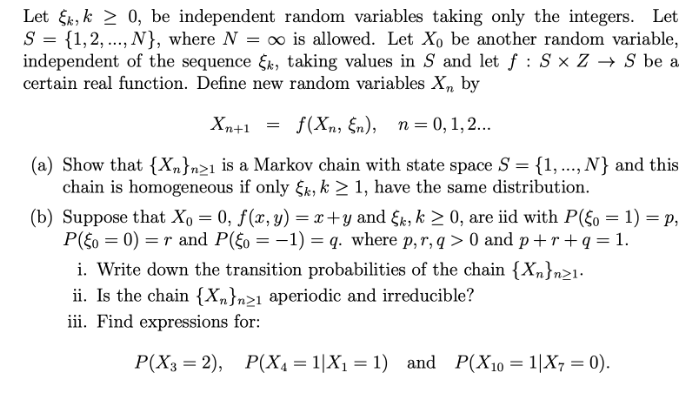Let Ek, k > 0, be independent random variables taking only the integers. Let S = {1,2, ..., N}, where N = ∞ is allowed. Let Xo be another random variable, independent of the sequence &k, taking values in S and let ƒ : S × Z → S be a certain real function. Define new random variables X,„ by Xn+1 = f(Xn, En), n = 0, 1,2.. (a) Show that {X„}n21 is a Markov chain with state space S = {1, ..., N} and this chain is homogeneous if only §k, k > 1, have the same distribution.
Let Ek, k > 0, be independent random variables taking only the integers. Let S = {1,2, ..., N}, where N = ∞ is allowed. Let Xo be another random variable, independent of the sequence &k, taking values in S and let ƒ : S × Z → S be a certain real function. Define new random variables X,„ by Xn+1 = f(Xn, En), n = 0, 1,2.. (a) Show that {X„}n21 is a Markov chain with state space S = {1, ..., N} and this chain is homogeneous if only §k, k > 1, have the same distribution.
Algebra and Trigonometry (MindTap Course List)
4th Edition
ISBN:9781305071742
Author:James Stewart, Lothar Redlin, Saleem Watson
Publisher:James Stewart, Lothar Redlin, Saleem Watson
Chapter14: Counting And Probability
Section14.2: Probability
Problem 3E: The conditional probability of E given that F occurs is P(EF)=___________. So in rolling a die the...
Related questions
Question
please solve all asap

Transcribed Image Text:Let Ek, k > 0, be independent random variables taking only the integers. Let
S = {1,2, ..., N}, where N = ∞ is allowed. Let Xo be another random variable,
independent of the sequence &k, taking values in S and let f : S x Z → S be a
certain real function. Define new random variables X, by
Xn+1
f(Xn, §n), n = 0, 1, 2...
(a) Show that {X„}n21 is a Markov chain with state space S = {1, .., N} and this
chain is homogeneous if only Fk, k > 1, have the same distribution.
(b) Suppose that Xo = 0, f(x, y) = x+y and fk, k > 0, are iid with P({o = 1) = p,
P(5o = 0) =r and P(£o = -1) = q. where p,r, q > 0 and p+r+q = 1.
i. Write down the transition probabilities of the chain {Xn}n>1-
ii. Is the chain {Xn}n>1 aperiodic and irreducible?
iii. Find expressions for:
P(X3 = 2), P(X4 = 1|X1 = 1) and P(X10 = 1|X7 = 0).
Expert Solution
This question has been solved!
Explore an expertly crafted, step-by-step solution for a thorough understanding of key concepts.
Step by step
Solved in 2 steps

Recommended textbooks for you

Algebra and Trigonometry (MindTap Course List)
Algebra
ISBN:
9781305071742
Author:
James Stewart, Lothar Redlin, Saleem Watson
Publisher:
Cengage Learning

College Algebra
Algebra
ISBN:
9781305115545
Author:
James Stewart, Lothar Redlin, Saleem Watson
Publisher:
Cengage Learning

College Algebra (MindTap Course List)
Algebra
ISBN:
9781305652231
Author:
R. David Gustafson, Jeff Hughes
Publisher:
Cengage Learning

Algebra and Trigonometry (MindTap Course List)
Algebra
ISBN:
9781305071742
Author:
James Stewart, Lothar Redlin, Saleem Watson
Publisher:
Cengage Learning

College Algebra
Algebra
ISBN:
9781305115545
Author:
James Stewart, Lothar Redlin, Saleem Watson
Publisher:
Cengage Learning

College Algebra (MindTap Course List)
Algebra
ISBN:
9781305652231
Author:
R. David Gustafson, Jeff Hughes
Publisher:
Cengage Learning

Algebra & Trigonometry with Analytic Geometry
Algebra
ISBN:
9781133382119
Author:
Swokowski
Publisher:
Cengage
